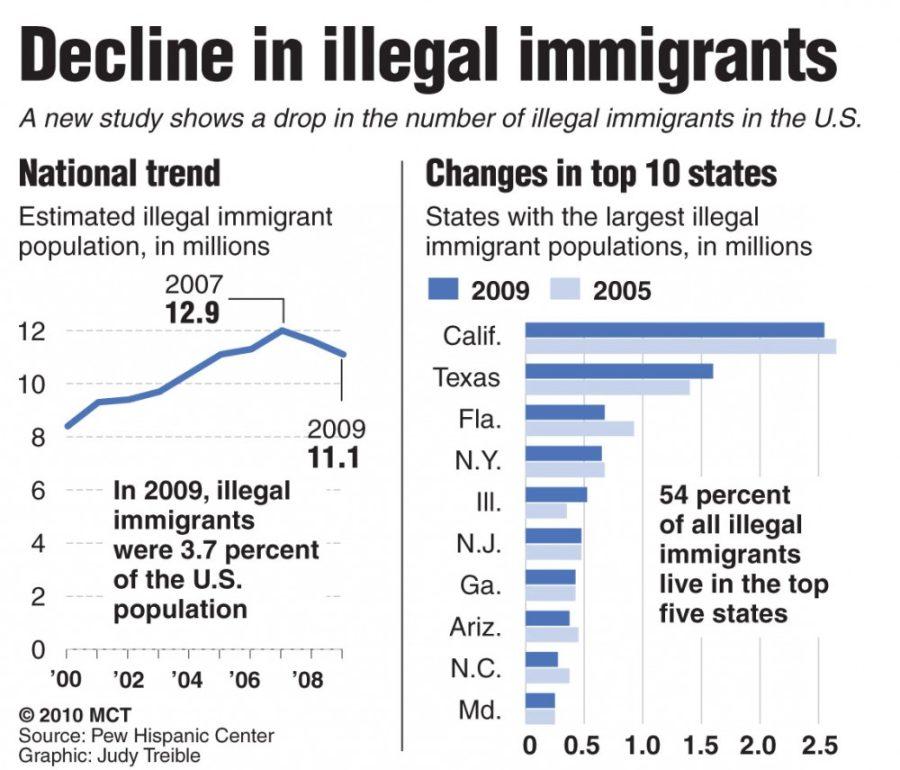WASHINGTON — Illegal immigration into the United States has slowed considerably in the last several years, a study released Wednesday concludes.
The decline marks the first significant turnaround in two decades, researchers with the nonpartisan Pew Hispanic Center say. As a result, the U.S. illegal immigrant population may have fallen as much as 8 percent from 2007 to 2009.
“”We’ve seen a reversal in what had been the long-term growth in the illegal immigrant population,”” researcher Jeffrey S. Passel said Wednesday.
An estimated 11.1 million illegal immigrants live in the United States. Possibly because of tighter enforcement measures and economic circumstances driving some immigrants back home, the population is down from its estimated 2007 peak of 12 million.
“”Particularly along the southern border, enforcement has ramped up considerably,”” Passel said. “”It’s harder and more dangerous for immigrants to cross into the country.””
From 2007 to 2009, an estimated 300,000 illegal immigrants sneaked into the United States annually. This marks an improvement over the period from 2005 to 2007, when an estimated 550,000 illegal immigrants entered annually, and 2000 to 2005, when an estimated 850,000 entered each year.
Homeland Security Department spokesman Matt Chandler attributed the decline in recent years to “”the administration’s unprecedented commitment of manpower, technology and infrastructure”” to the nation’s borders.
“”The Southwest border is more secure than ever before,”” Chandler declared.
Illegal immigrants remain concentrated in a small number of states. An estimated 2.5 million live in California, 1.6 million live in Texas and 675,000 live in Florida.
California’s illegal immigrant population is down an estimated 3 percent from 2005, while Florida’s fell a far more dramatic 27 percent. In Texas, the illegal immigrant population may have increased slightly, though Passel said that this fell within the margin of error.
The researchers caution that their findings, which are based on sampling, are subject to a margin of error, and warn of the inherent uncertainties in tracking an illegal population. Consequently, the overall illegal immigrant population estimates are described as “”not conclusive.””
For instance, the estimated illegal immigrant population of 11.1 million represents a midpoint in the range between 10.6 million and 11.6 million.
Parts of the 37-page study track some other studies, including a Department of Homeland Security assessment that the number of illegal immigrants fell from 11.8 million in 2007 to 10.8 million in 2009. The researchers used different Census Bureau data for their respective studies.
The Pew Hispanic Center study arrives at a politically charged time, as state and federal lawmakers debate immigration revisions and border security measures. The Obama administration is challenging a new Arizona law that requires police to check the identification papers of suspected illegal immigrants, and Congress is considering new legislation.
“”Our borders are just too vast for us to be able to solve the problem only with fences and border patrols,”” President Barack Obama said in July, adding that “”stopping illegal immigration must go hand in hand with reforming our creaky system of legal immigration.””
Some things haven’t changed much in recent years, according to the Pew researchers.
The vast majority of illegal immigrants still come from Latin America, with Mexico alone accounting for 60 percent.
It’s still a young population. Notably, the number of U.S.-born children of illegal immigrants nearly doubled from 2000 to 2009. An estimated 4 million children of illegal immigrants were born in the United States during that time, and thus are U.S. citizens.
A bill co-sponsored by 93 members of the House of Representatives would eliminate the so-called “”birthright citizenship”” privilege accorded under the 14th Amendment to all those born in the United States. The bill is a long shot because of the constitutional hurdles, though it’s captured considerable attention.
“”Those who are just passing through do not qualify,”” Rep. Brian Bilbray, R-Calif., declared on Fox News earlier this year. “”The right of birthright citizenship is earned by your parents’ obligation to serve the country.””









